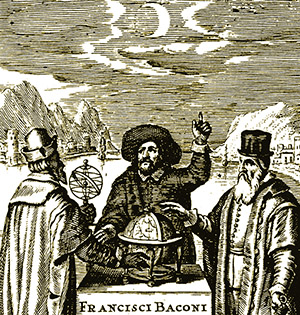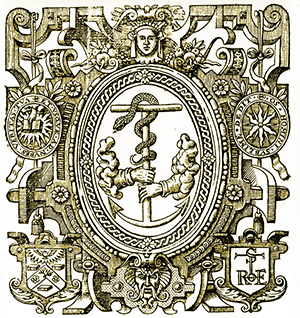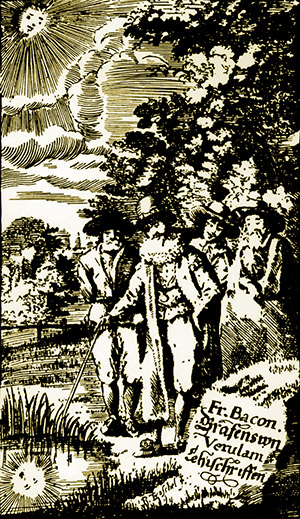Mysteries
“Wherefore let the first difference of method be set down, to be either Magistral or Initiative: neither do we so understand the word Initiative as if this should lay the groundwork, the other raise the perfect building of Sciences; but in a far different sense, (borrowing the word from sacred Ceremonies) we call that Initiative Method, which discloses and unveils the Mysteries of Knowledges. For Magistral teaches, Initiative insinuates: Magistral requires our belief to what is delivered, but Initiative that it may rather be submitted to examination. The one delivers popular sciences fit for learners, the other sciences as to the Sons of Science.”
Francis Bacon: Of the Advancement and Proficience of Learning, Book 6 (1640) – translation by Gilbert Watts of Bacon's De Dignitate et Augmentis Scientiarum.
The word 'mystery' is derived from the Greek word mysterion (plural mysteria), which refers to a play in which the truths of life are presented dramatically, often allegorically or symbolically, such as the Christian mystery of Mass or Holy Communion. The idea is to give the participants (actors and audience) a direct apprehension of truth through the experience of the mystery, rather than just academic knowledge; for ultimately it is only through the practical experience and practice of truth that we can prove it and really know it.
The basis of all such mysteries is the underlying truth that we each reach illumination or knowledge of truth in four stages or degrees that are patterned on the fundamental life process of desire followed by thought followed by action. The first three degrees (the Lesser Mysteries) are: (1) the development of our desires or will into loving desires or goodwill, having faith in that love; (2) the development of our thoughts into good thoughts and understanding, filled with hope; and (3) the development of our actions into good deeds, with humility and charity. The culmination of this results in the fourth degree, which concerns the illumination and joy that comes after completing each good deed, reflecting on it, remembering the whole process and giving thanks. The third degree, which is love in action, is referred to as self-sacrifice culminating in psychological death; the fourth degree is referred to as resurrection from that death and ascension into the joyous light of illumination. The higher degrees (the Greater Mysteries) are involved with the further development and expansion of illumination via the path of loving, self-sacrificial service to the world and ultimately to the universe.
In his Address to the King (King James I) in the 1620 Instauratio Magna prefacing Novum Organum, Bacon refers to this illumination as a "new light" which he is kindling:
"I wish that if there be any good in what I have to offer, it may be ascribed to the infinite mercy and goodness of God, and to the felicity of your Majesty's times; to which as I have been an honest and affectionate servant in my life, so after my death I may yet perhaps, through the kindling of this new light in the darkness of philosophy, be the means of making this age famous to posterity..."1
Philosophy, as Bacon states, needs to go hand in hand with Divinity. The two together, like twins, are needed to reach illumination. This is why the first publication of his grand project, The Great Instauration, was announced in 1605 with the title (in full), The Two Bookes of Francis Bacon. Of the proficience and advancement of Learning, divine and humane.
In Book II of this 1605 Advancement of Learning, Bacon writes:
"The knowledge of man is as the waters, some descending from above, and some springing from beneath: the one informed by the light of nature, the other inspired by divine revelation. The light of nature consisteth in the notions of the mind and the reports of the senses; for as for knowledge which man receiveth by teaching, it is cumulative and not original, as in a water that besides his own spring-head is fed with other springs and streams. So then, according to these two differing illuminations or originals, knowledge is first of all divided into divinity and philosophy."2
Bacon also notes in Book II of his 1605 Advancement of Learning:
"For as the proficience of learning consists much in the orders and institutions of universities, in the same states & kingdoms: So it would be yet more advanced, if there were more intelligence mutual between the universities of Europe, then now there is. We see, there be many Orders and Foundations, which though they be divided under several sovereignties, & territories, yet they take themselves to have a kind of contract, fraternity, & correspondence, one with the other, insomuch as they have Provincials and Generals. And surely as Nature creates brotherhood in families, & arts mechanical contract brotherhoods in communalities, and the anointment of God superinduces a brotherhood in kings & bishops: so in like manner there cannot but be a fraternity in learning and illumination, relating to that Paternity, which is attributed to God, who is called the Father of illuminations or lights."3
In this quote Bacon specifically mentions "a fraternity in learning and illumination". And in the quote given at the head of this page, Bacon refers to the Initiative Method, "which discloses and unveils the mysteries of knowledges," and to the "sons of science". What is he referring to?
The answer refers to the fact that Bacon was involved in the mysteries and designed his Great Instauration accordingly. He believed that we should apply our knowledge to charitable purposes only; that we can only discover and know the higher laws of nature by acting charitably, as the ultimate law of the universe is Love, which he explains is love in action—"the work that God works from the beginning to the end".4 In two memorable statements he says: –
"In sum, I would advise all in general, that they would take into serious consideration the true and genuine ends of knowledge; that they seek it not either for pleasure, or contention, or contempt of others, or for profit, or fame, or for honour and promotion, or such like adulterate or inferior ends; but for the merit and emolument of life; and that they regulate and perfect the same in charity." 5
"I take Goodness in this sense, the affecting of the weal of men, which is that the Grecians call philanthropia; and the word humanity (as it is used) is a little too light to express it. Goodness I call the habit, and goodness of nature the inclination. This of all virtues and dignities of the mind is the greatest; being the character of the Deity: and without it man is a busy, mischievous, wretched thing; no better than a kind of vermin. Goodness answers to the theological virtue Charity, and admits no excess, but error." 6
Bacon is clearly talking about a mode of life and behaviour that the great religions and mystery schools have endeavoured to teach us for millennia. As a devout Christian he is almost certainly thinking of the teachings of Christ, but the same teachings have also been taught in the Hermetic-Orphic-Platonic wisdom tradition and mystery schools, and have their equivalent, for instance, in the karma yoga of Hinduism and the noble path of Buddhism. Indeed all the great mysteries, including the Christian mysteries, have endeavoured to teach humanity a charitable or philanthropic way of life. Basically, this means a life of human kindness, respect, helpfulness, generosity and friendship; which is why the philosophy which Bacon promotes is a "moral philosophy": –
"And if it be said, that the cure of men's minds belongeth to Sacred Divinity, it is most true: but yet Moral Philosophy may be preferred unto her as a wise servant and humble handmaid. For as the Psalm saith, that the eyes of the handmaid look perpetually towards the mistress,7 and yet no doubt many things are left to the discretion of the handmaid, to discern of the mistress's will; so ought Moral Philosophy to give constant attention to the doctrines of Divinity, and yet so as it may yield of herself, within due limits, many sound and profitable directions." 8
We are given further clues as to what Bacon means by "Sons of Science" and "a fraternity in learning" from the symbolic names that he adopted, was given, or was associated with: Apollo, Athena, Hermes, Plato, Shakespeare, Solomon, St Alban, Elias the Artist and Fra. C.R.C. (or Francis Rosicross). These names relate in one way or another to the Classical, Renaissance, Cabalistic, Christian, Freemasonic and Rosicrucian fraternities and their mysteries, all of which are dedicated to friendship and charity. Moreover, all of these, like everything else, are subject to change and, in the initiatory sense, to cyclical death and resurrection (or rebirth), transforming, transmuting, multiplying, inspiring others and seeding the new.
As Bacon emphasised, "Time brings forth the hidden Truth," little by little, cycle after cycle—and there are minor cycles and major cycles, wheels within wheels.9 In every case there is a beginning and an ending. If the beginning is one of love, and the ending is of love fully manifested and known, then these two are truly what is named the Alpha and the Omega,10 or Genesis and Revelation, Spirit and Bride, Lover and Beloved. Then there is joy.
In the mystery tradition in which Bacon was a great initiate, these two are symbolised by the cipher AA, for in true love the beginning and ending are fundamentally the same, and the ending becomes a new beginning. This deeply meaningful cipher was employed by Francis Bacon and the Rosicrucian fraternity as a signature on certain works. It can also appear as TT, since, in terms of the Hebrew alphabet, the first letter is Aleph and the last letter is Tau; thus, for the same reasons as given above, AA can also be TT. These signatures (when they are noticed) are gateways into the great Mystery.



